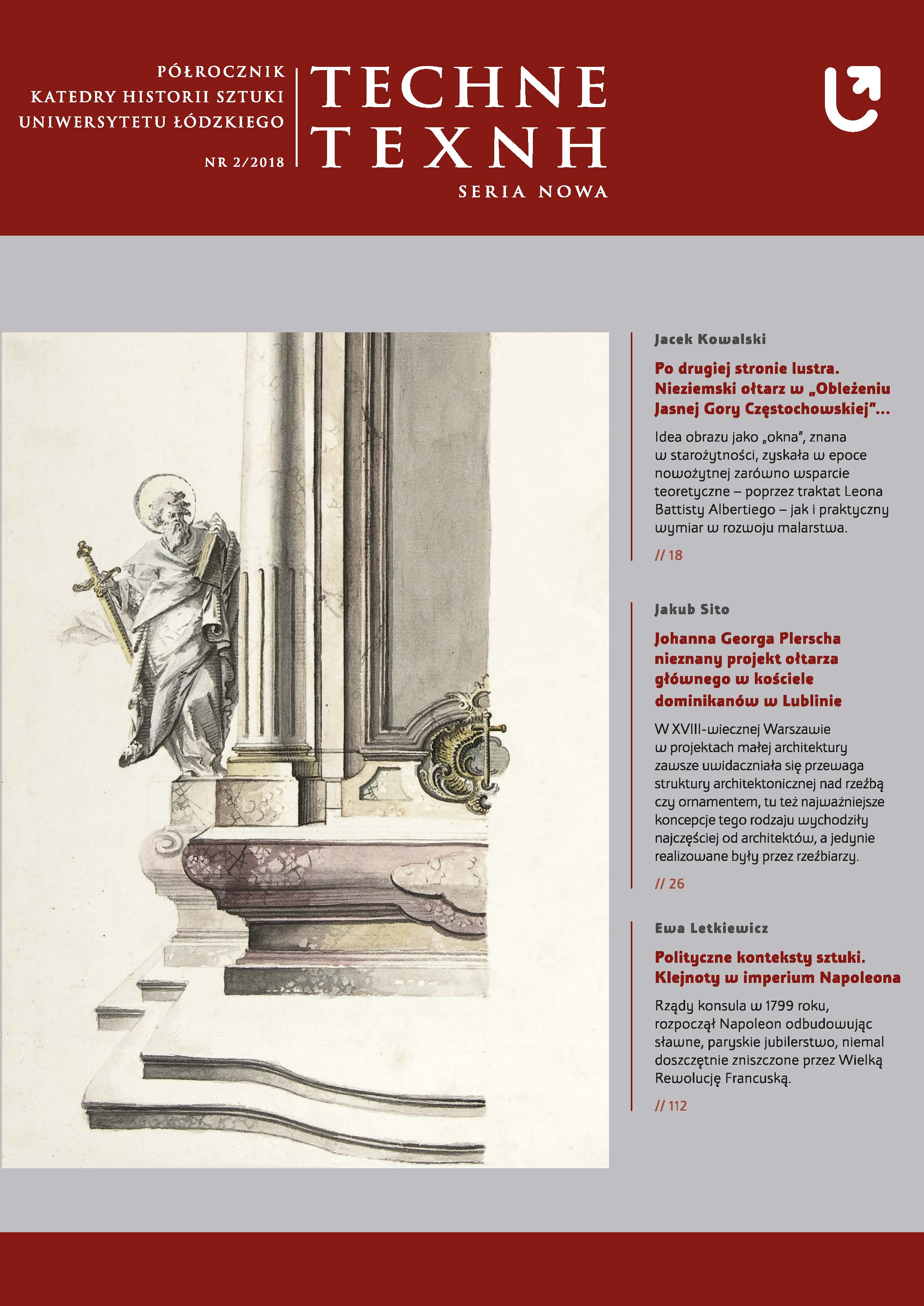Polityczne konteksty sztuki. Klejnoty w imperium Napoleona
DOI:
https://doi.org/10.18778/2084-851X.06.06Słowa kluczowe:
biżuteria, jubilerstwo, XIX wiek, Francja, Napoleon BonaparteAbstrakt
The period between 1799 and 1814 was the time of Napoléon Bonaparte’s sole reign over France, initially as First Consul of the Republic, and from 1804 as Emperor of the French. Son of a modest Corsican advocate, Napoléon recognised the power of gold, and turned gems and jewels into a potent tool of power during his 15-year rule. He hired the most prominent jewellers of the time, who created the empire style, characterised by an ostentatious abundance of materials, masterly artwork, and imagery associated with wealth, might and power.
Empire-style gems are famous for their proportion, simplicity of lines and forms, and the introduction of such typical motifs as imperial eagles placed within laurel or oak wreaths, bees, ‘N’ monograms, garlands made of flowers, fruit and laurel leaves, Greek-themed bands aligned with geometrical precision, tureens, medallions, and cornucopias45. Napoléon’s flagship jewels, however, were engraved gems, both ancient and newly made, which were manufactured from ivory, coral, amber, and other stones. They presented ancient gods and goddesses, and such Egyptian symbols as sphinxes, the Eye of Ra, and scarab beetles. Lavish gems, produced from expensive raw materials, and most preferably diamonds, were used to stud orders, decorations, and gift jewellery used to maintain political and diplomatic ties, to endear enemies, and to reward merits and achievements.
The empire style has turned out to be timeless and enduring, as numerous patterns developed during the period have become the classics of haute joaillerie today.
Bibliografia
Chevallier 2015 – Bernard Chevallier, Para pantofli należących zapewne do cesarzowej Józefiny, Spódnica z trenem cesarzowej Józefiny, noty, [w:] Napoleon i sztuka. Katalog wystawy Zamku Królewskiego Warszawie we współpracy z Musée national du Palais Compiègne i Réunion des musées nationaux – Grand Palais, w dniach 11 września – 13 grudnia 2015 roku, red. Przemysław Mrozowski, Maciej Choynowski, Marta Zdańkowska, Warszawa 2015, s. 88.
Google Scholar
Dawes/Collings 2010 – Ginny Redington Dawes, Olivia Collings, Georgian Jewellery 1714–1830, Woodbridge 2010.
Google Scholar
Dion-Tenenbaum 2015 – Anna Dion-Tenenbaum, Złotnictwo paryskie z początków XIX wieku – zmiana i ciągłość, [w:] Napoleon i sztuka. Katalog wystawy Zamku Królewskiego Warszawie we współpracy z Musée national du Palais Compiègne i Réunion des musées nationaux – Grand Palais, w dniach 11 września – 13 grudnia 2015 roku, Warszawa 2015, s. 42–47.
Google Scholar
Goetz/Joannis 2008 – Adrien Goetz, Claudette Joannis, Jewels in the Louvre, Paris 2008.
Google Scholar
Gübelin/Erni 2001 – Eduard Gübelin, Franz-Xaver Erni, Kamienie szlachetne. Symbole piękna i władzy, Warszawa 2001.
Google Scholar
Hinks 1975 – Peter Hinks, Nineteenth Century Jewellery, London 1975.
Google Scholar
Joannis 1992 – Claudette Joannis, Bijou des régions de France, Paris 1992.
Google Scholar
Letkiewicz 2011 – Ewa Letkiewicz, Klejnoty w osiemnastowiecznej Polsce, Lublin 2011.
Google Scholar
Mabille 2001 – Gérard Mabille, Les Diamants de la Couronne, Paris 2001.
Google Scholar
Mason/Packer 1973 – Anita Mason, Diane Packer, An Illustrated Dictionary of Jewellery, Hampshire 1973.
Google Scholar
Munn 2002 – Geoffrey Munn, Tiaras. Past and Present, London 2002.
Google Scholar
Newman 1996 – Harold Newman, An Illustrated Dictionary of Jewelry, London 1996.
Google Scholar
Phillips 1996 – Clare Phillips, Jewelry. From Antiquity to the Present, London 1996.
Google Scholar
Phillips 2003 – Clare Phillips, Jewels and Jewellery, London 2003.
Google Scholar
Pointon 2009 – Marcia Pointon, Brilliant Effects. A Cultural History of Gem Stones and Jewellery, Yale University Press New Haeven and London 2009, s. 165, il. 188.
Google Scholar
Sallois 2015 – Mélanie Sallois, Diadem w kształcie pęku kłosów zboża, nota, [w:] Napoleon i sztuka. Katalog wystawy Zamku Królewskiego Warszawie we współpracy z Musée national du Palais Compiègne i Réunion des musées nationaux – Grand Palais, w dniach 11 września – 13 grudnia 2015 roku, Warszawa 2015, s. 150–151.
Google Scholar
Scarisbrick 2008 – Diana Scarisbrick, Le grand frisson. Bijou de sentiment de la Renaissance à nos jours, Paris 2008.
Google Scholar
Scarisbrick/Vachaudez/Walgrawe 2008 – Diana Scarisbrick, Christopher Vachaudez, Jan Walgrawe, Royal Jewels. From Charlemagne to the Romanovs, New York, 2008.
Google Scholar
Starcky 2015 – Emmanuel Starcky, Orzeł zadziwiony albo zdumiewający styl cesarstwa, [w:] Napoleon i sztuka. Katalog wystawy Zamku Królewskiego Warszawie we współpracy z Musée national du Palais Compiègne i Réunion des musées nationaux – Grand Palais, w dniach 11 września – 13 grudnia 2015 roku, Warszawa 2015, s. 18.
Google Scholar
Terrier Aliferis 2004 – Laurence TerrierAliferis, Se souvenir de Charlemagne au XIIe siècle, „Thesis: Cahier d’histoire des collections collections et de muséologie”, t. 5–6 (2004), s. 7–29.
Google Scholar
Vever 2001 – Henri Vever, French Jewelry of the Ninetheenth Century, London 2001.
Google Scholar
Empress Josephine’s engagement ring, http://www.thecourtjeweller.com/2016/11/the-sunday-ring-empress-josephines.html [dostęp 23.10.2018]
Google Scholar
Korona cesarska Napoleona I, https://pl.wikipedia.org/wiki/Korona_cesarska_Napoleona_I [dostęp 28.10.2018].
Google Scholar
Koronacja Napoleona, https://pl.wikipedia.org/wiki/Koronacja_Napoleona [dostęp 27.10.2018].
Google Scholar
Louis Miguel Howard, The French Crown Jewels, part 2, The Deluge and After, https://www.luismiguelhoward.com/blog/2017/9/6/the-french-crown-jewels-part-2-the-deluge-and-after [dostęp 20.10.2018]
Google Scholar
Luwr – skarbiec artystów świata – Mekka turystów, https://www.polskieradio.pl/39/246/Artykul/956251,Luwr-skarbiec-arcydziel-swiata Mekka-artystow [dostęp 20.10.2018].
Google Scholar
Maison Bapst Jewelry Maker’s Mark, https://www.langantiques.com/university/Bapst,_Maison_Jewelry_Maker’s_Mark [dostęp 20.10.2018]
Google Scholar
Marie Louise Diadem, https://commons.wikimedia.org/wiki/File:Marie_Louise_Diadem.jpg?uselang=pl [dostęp 27.10.2018].
Google Scholar
Napoleon_Diamond_Necklace, https://commons.wikimedia.org/wiki/File:Napoleon_Diamond_Necklace.jpg [dostęp 27.10.208]
Google Scholar
Piotr Paweł Bajer, Stylizacja heraldyczna czasów napoleońskich, http://web.archive.org/web/20090619103646/http://www.szlachta.org/Bajer_Napoleon.htm [dostęp 20.10.2018]
Google Scholar
Pobrania
Opublikowane
Jak cytować
Numer
Dział
Licencja

Utwór dostępny jest na licencji Creative Commons Uznanie autorstwa – Użycie niekomercyjne – Bez utworów zależnych 4.0 Międzynarodowe.








